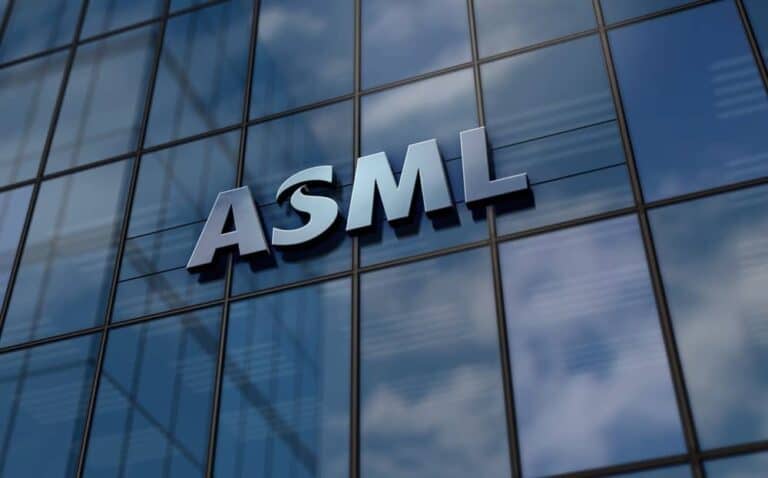US president Donald Trump has rolled out import tariffs for all kinds of countries. Goods from the European Union face a tariff of 20 percent as soon as they appear in the US. This development and many others have prompted ASML CEO Christophe Fouquet to speak out about the increasing geopolitical tensions. The Dutch chip machine manufacturer emphasizes that international cooperation is crucial for progress in the sector.
““Our industry has been built basically on the ability of people to work together, to innovate together,” Fouquet said during an industry event in the Netherlands on Thursday, which Bloomberg has a recording of. He emphasized that export controls and increasing geopolitical tensions undermine this cooperation, without specifically addressing the new US import tariffs.
Impact on European tech sector
Tech companies in the European Union that are confronted with a 20 percent levy are still determining the impact on their business activities and supply chains. ASML is the only manufacturer of EUV lithography machines in the world and is therefore in a unique position. Without ASML’s machines, it will be impossible for semiconductor companies to produce the chips needed for high-quality smartphones and computers.
Although the tariffs announced by Trump exclude semiconductors, they do not specifically mention chip machines like those made by ASML. The latest models are said to cost 350 million dollars each. Import tariffs could mean that Intel and the American branch of TSMC could have to hand over more than 400 million dollars net. An ASML spokesperson declined to comment to Bloomberg on how the tariffs could affect the company.
According to Thornburg Investment Management, which the news agency spoke to, the direct short-term effects could be limited. In 2024, approximately 16 percent of ASML’s net sales came from customer facilities in the United States, according to the company’s annual report. ASML’s heavy reliance on revenue from China is yet another concern entirely, but it does ensure that the current tariffs could have a limited effect.
Expansion in the US
Several major ASML customers, including Intel, TSMC and Samsung, are expanding their activities in the US, with plans to build a series of new chip factories in the coming years. Together with the AI initiative Project Stargate, the outlines of a North America-centered ecosystem for the production and use of advanced chips are becoming visible, although international dependence is virtually impossible to eliminate. For example, some substances such as gallium nitride, a possible substitute for silicon in chips, mainly come from China.
Bloomberg also notes that the financial picture for US expansion for chip players is actually positive. An important stimulus for American expansion is a 25 percent tax break on investments, part of the Chips and Science Act of 2022, which can be used to compensate for the purchase of expensive chip machines. In the long term, this could have a positive effect on the sale of ASML equipment in the US, and therefore also on ASML itself, despite the import tariffs.
Broader trade conflicts
Trump’s so-called ‘reciprocal tariffs’ affect both allies and opponents, with a reach that goes far beyond any trade measures from his first term. This also affects the Netherlands and several other major exporters of chip machines, such as Japan (now facing a 24 percent tariff) and South Korea (26 percent import tariffs).
The EU is preparing a package of retaliatory measures, said Dutch Minister for Foreign Trade Reinette Klever, whereby individual countries have the option of supplying input. “I met with the US trade representative in Washington a few weeks ago and there I stressed the importance of reciprocal trade and that remains our commitment in the future,” Klever stated. She refused to comment to Bloomberg on the question of whether the Netherlands would seek exemptions for ASML.
Increasing pressure on the chip industry
As mentioned above, the situation for ASML was already complex due to the previously imposed export restrictions to China. These have almost always been adopted by the Netherlands based on the wishes of the US, under both former president Biden and Trump. Fouquet, who last year succeeded ASML veteran Peter Wennink, faces the challenge of leading ASML through this turbulent period. In fact, the situation is becoming increasingly challenging for the chip machine manufacturer. In recent years, export restrictions have led to an expansion to DUV machines, where previously only high-tech EUV chip manufacturing machines were subject to restrictions.
The European semiconductor industry is now trying to strengthen its position. The European Semiconductor Industry Association (ESIA), of which ASML is a member, has called on the EU to hurry up with more support for the sector and to ensure fewer export restrictions to give the European chip industry a boost.
Global competition
We have not even mentioned the growing diversity of competitors on the world stage. In addition to the established players such as Taiwan, South Korea, the US and Japan, new parties such as Saudi Arabia are also vying for a key role in the chip industry.
With ASML, the Netherlands has acquired a crucial position in global chip production, but here too, issues are arising that could change the situation. The Dutch government has set up Project Beethoven, a program to keep chip machine manufacturers such as ASML in the country, although it recently became apparent that this project is at risk of falling behind schedule. The situation must change now if all ambitions are to be realized before 2030, and for that to happen, ASML may have to relocate some of its activities abroad.
Despite the challenges, ASML’s position as an indispensable player in the chip industry remains undisputed, but the increasing geopolitical tensions pose a threat to the international cooperation that Fouquet believes is crucial for further innovation in the sector.
